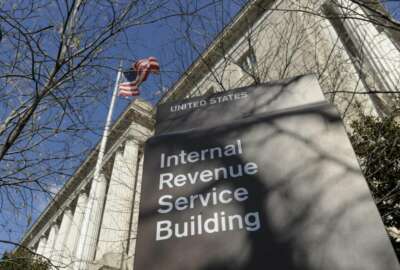

Congress appears ready to sign off on giving the IRS its biggest budget in nearly a decade, giving the agency enough resources to begin to roll out the latest i...
Best listening experience is on Chrome, Firefox or Safari. Subscribe to Federal Drive’s daily audio interviews on Apple Podcasts or PodcastOne.
Faced with a shrinking budget and workforce, the IRS has dealt with difficult cuts to its taxpayer service and enforcement activities, but fiscal 2020 is shaping up to be a better year for the tax agency.
Congress appears ready to sign off on giving the IRS its biggest budget in nearly a decade, giving the agency enough resources to begin to roll out the latest in a series of modernization efforts.
But even with the funding boost, watchdog officials told members of the House Appropriations Committee the IRS will face a growing workload in the years ahead, and might encounter the same challenges that have undermined earlier IT modernization efforts.
In addition to its current duties, the IRS will begin to roll out new programs under the Taxpayer First Act that Congress passed this summer.
The bill, among other things, tasks the agency with overhauling its defunct Oversight Board and requires the agency to develop a comprehensive employee training strategy focused on digital services.
J. Russell George, the Treasury Inspector General for Tax Administration, told committee members on Thursday that the IRS would need another $430 million and 700 additional full-time employees over the next three years to complete all the reforms outlined in the bill.
At the same time, the IRS has also set into motion a six-year IT modernization strategy that will cost nearly $3 billion and has plans to award a $1 billion cloud computing contract by fiscal 2022.
The IRS has ambitious plans in mind, but lawmakers remain skeptical about the agency’s track record in executing similar plans over the past few administrations.
“The federal government and the IRS have had a poor history of the implementation of modernization plans, but I know Commissioner [Chuck] Rettig is committed to improving this,” Rep. David Joyce (R-Ohio) said.
Lawmakers have more breathing room to draft a final spending bill for fiscal 2020, after passing a seven-week continuing resolution on Thursday, but the House and Senate still have to reconcile about a half-billion gap in funding for the IRS.
The House version of the spending bill proposes a $12 billion budget for the IRS, but the Senate Appropriations Subcommittee on Financial Services and General Government has set an $11.4 billion budget for the agency.
The more modest Senate proposal would still amount to a $200 million funding increase compared to current spending levels, and would be the agency’s largest budget since 2012, according to Sen. John Kennedy (R-La.), the subcommittee chairman.
Whether or not Congress puts up the long-term funding to ensure the success of the IT modernization overhaul, George said the IRS hasn’t had much of a return on investment to show for its earlier projects.
“This has been a nightmarish experience dating back decades and involving billions of dollars,” George said. “If implemented effectively, it would achieve the goals that they state they want to achieve — more efficient information to taxpayers and the ability to process tax forms more efficiently. However, if past is prologue, it’s going to be a challenge for them.”
Despite longstanding complaints about its legacy IT systems, the IRS has run a robust cybersecurity program.
While the IRS in 2018 suffered a major computer glitch that postponed the tax filing deadline by a day, George said he hasn’t seen an external breach of the IRS’s system during his 15 years as the IG.
The IRS sees about a million intrusion attempts on its systems nearly every day, but James Jackson, the deputy IG for investigations, said the majority of those attempts don’t amount to serious threats.
“It’s like if you’re not home and someone comes by and rattles your door, they don’t actually get in,” Jackson said.
But since the IRS holds sensitive financial information on every taxpayer in the country, cybersecurity teams within the agency and its IG office continue to work together to monitor for external and internal threats.
The IRS has seen “several attempts” at ransomware, Jackson said, but the IRS has “thwarted those attempts” and continues to stay one step ahead of cyber adversaries.
“They’ve done a really good job, but the environment is continuously changing and they’re continuously working to adapt to that,” he said.
The IRS and the IG’s cybersecurity teams, Jackson added, run through security scenarios and table-top exercises that test the agency’s capability to lock down certain points of the IRS in the event of a breach or outage.
The IG office, Jackson added, has a cyber team positioned outside of the IRS computer security center, and has safeguards against insider threats.
“Any time an IRS employee or internal employee would look at taxpayer [data] without a business reason, it would set up a trip flare and let us know what’s going on,” he said.
Rep. Mike Quigley (D-Ill.), chairman of the financial services and general government, said the IRS faces “critical skill gaps” in light of a 19% reduction of its workforce since 2011.
The IRS has faced some of the most significant hollowing out of its enforcement staff. From fiscal 2014 to 2018, the agency has seen a 23% drop in revenue officers, and since 2011, the agency has conducted 40% fewer audits.
Members of the subcommittee raised concerns over reports that audits have disproportionately impacted lower-income taxpayers.
In response, George said the agency’s enforcement staff has an easier time vetting the earned income tax credit claimed by low- to moderate-income household “especially with the work of junior IRS employees,” compared to the more complex filings from wealthier households.
“The more sophisticated the income tax, the more involved it is, the longer it takes, and it really boils down to how they allocate their resources,” George said. “None of our work has shown any evidence that a bias is occurring in terms of those with money versus those with less money, but there’s no question that more low-income people are being examined than upper-income people.”
Copyright © 2024 Federal News Network. All rights reserved. This website is not intended for users located within the European Economic Area.
Jory Heckman is a reporter at Federal News Network covering U.S. Postal Service, IRS, big data and technology issues.
Follow @jheckmanWFED



